Personal hardship led Julie McGuire to backcountry skiing. This winter she became the third person and first woman to ski all 33 of the Catskill Mountains’ High Peaks.
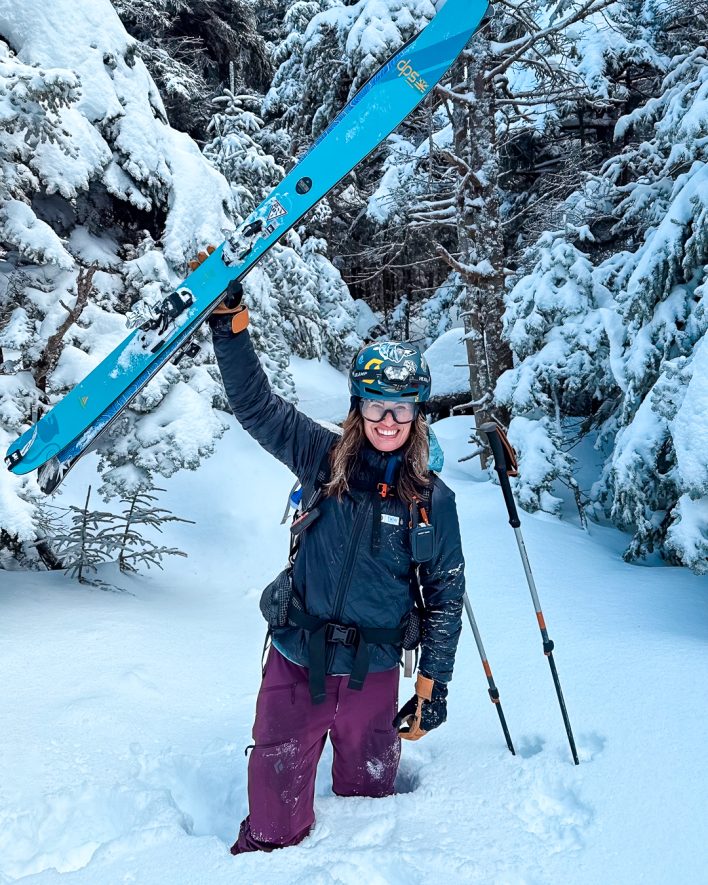
It was dark by the time Julie McGuire made her way down to a service road on New York’s Sugarloaf Mountain. A recent storm had hidden tree blazes and a lack of cell service left her bushwhacking for hours. What she thought would be the easiest part—skiing the trail out—turned out to be the toughest. “Oh man,” McGuire thought to herself, “I’m going to be out here until 1 a.m.”
That was three years ago, when McGuire was only a few months into her ambitious project to ski all 33 of the Catskills’ 3,500-foot-plus High Peaks.
Hiking these peaks has always been an accomplishment admired in the New York outdoor community. Skiing all 33 requires not just a few long days, but serious dedication to the unpredictable conditions of the eastern backcountry. Perhaps that’s why McGuire, the third person to ever complete the feat, did so only a few months ago.
Born and raised in New York City, McGuire split her childhood between the city and the Catskills. She started skiing at age 10 but stopped in her teens. It was only in her mid-20s, after ending a toxic, interest-stifling relationship, that she rediscovered the sport. Solo trips to Hunter Mountain, a ski area in upstate New York, became McGuire’s outlet for renewal.
“I was afraid to go to the top. So I rode the B lift up to midway,” she recalls. Despite pouring rain, McGuire lapped the trail for hours. “Even the lifty was like, ‘Man, you got heart.’”
In the following years, McGuire moved on, married and found joy in resort skiing. Then, in 2018, her ex-wife unexpectedly requested a divorce. “I was totally blindsided,” says McGuire.
While struggling with depression after their breakup, McGuire discovered an ad for PowderQuest’s Women’s Backcountry Skiing Camp in Patagonia, Argentina. Three words in the description lit up something inside her: “no experience necessary.”
“I felt worthless,” McGuire remembers. “But I knew that this could be something. That I should go and ski.”
So, she flew to Argentina for the camp. It marked a turning point in her recovery, bringing laughter and joy back into her life. When she returned home to New York, she began hiking in the Catskills, aiming to join the 3500 Club, which recognizes people who have hiked the range’s 33 peaks over 3,500 vertical feet. She wanted to develop her navigation skills and independence, areas her ex-wife had previously led.
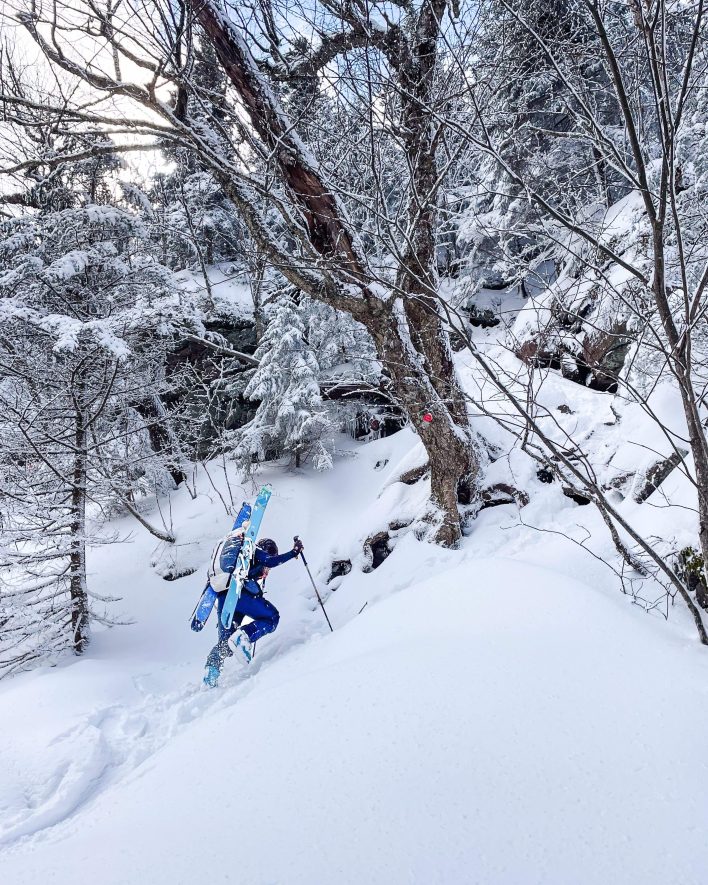
A year later, during the COVID-19 pandemic, McGuire began teaching remotely from the Catskills, allowing her to ski more. When the pandemic ended, she partnered with Winter4Kids to introduce underserved youth to winter sports and founded a ski and snowboard club at her school in New York City, offering lessons and volunteering with students. “It helped move all that negative energy from the divorce,” she says. “Once that shifted, my defenses eased, and I could start healing and really gain some perspective and wisdom.”
While hiking the Catskill 33, McGuire wondered if she could ski the peaks she walked on. Though she initially dismissed the idea, it lingered in the back of her mind. “Let me see how far I can get,” she said to herself one day. This simple decision became her driving force. On January 18, 2021—what would have coincidentally been her wedding anniversary—she began to ski.
Despite their relatively low elevation, the Catskill High Peaks are known for their rugged terrain, including tight trees, narrow chutes and cliffs with no runouts. The most challenging part? There’s almost no information available on skiing them.
Before McGuire, only two others—brothers Jamie and Doug Kennard—had completed the endeavor, and they left limited information about routes, trails and techniques. Still, McGuire was not deterred.
Though she was solo for most of the peaks, she slowly began to accrue a network of support. Initially, her connections were limited to online Northeast ski groups, but as she progressed, the responses she received on her social media posts about skiing the High Peaks began to build a sense of community. Over time, the tight-knit ski community became her cherished “ski family,” supporting her as she closed in on her goal.
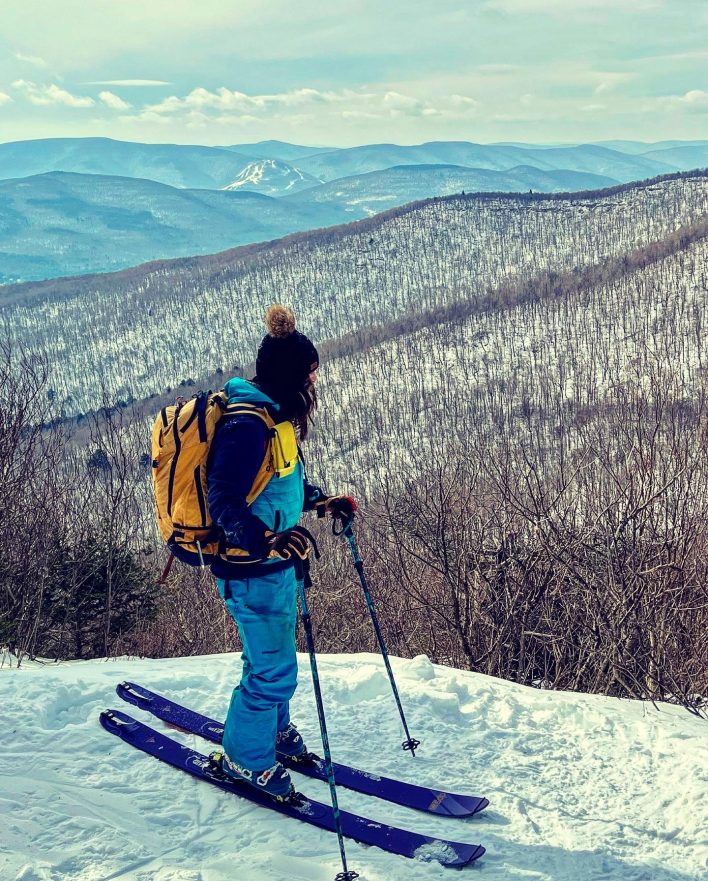
On Dec. 1, 2024, McGuire summited and skied Kaaterskill High Peak, completing the last descent on her list of 33. In an Instagram post from that day she writes, “No matter how confident you think you are, there are situations that make you question yourself. When I climb and ski something challenging, I have indisputable proof of my worth. I think everybody should have access to the outdoors so that they can experience the state of consciousness natural beauty facilitates and test their mettle with challenges.”
From the start, McGuire’s skiing journey has been defined by finding a sense of belonging. Relearning to downhill ski at 27 while living in New York City and taking up backcountry skiing over ten years later, at 39, is an uncommon trajectory. McGuire admits, despite her accomplishments, that she still struggles with imposter syndrome and often questions whether she truly fits in.
But, when the weather shifts and the conditions become really tough, McGuire has noticed that even people with big mountain experience get anxious. McGuire reminds herself to stay calm, knowing she’s in her element. “That’s when I say, ‘I do belong out here.’”
This imposter syndrome, she says, often extends beyond her skiing skills to being a woman in the sport. She emphasizes the importance of representation. “It’s the fact that I am the only woman that’s intimidating,” she says. “You feel out of place and you start to wonder if you truly belong there.”
McGuire is thrilled about what her accomplishment represents for women in the ski community, especially as it gains traction on social media—which she sees as a powerful tool in showcasing women in the sport. “It kind of makes us feel more comfortable taking those initial steps,” says McGuire. Looking ahead, she hopes to organize women’s skiing or backcountry skiing clinics to teach equipment usage and basic skills to empower more women to explore the sport.
She also plans to continue pressing deeper into the mountains herself. A recipient of the 2025 Women’s Ski Mountaineering Scholarship awarded by East Coast Avalanche Education, McGuire will attend a course at Tuckerman Ravine in February focused on rescue and rope skills and navigating safely through avalanche terrain. Then, she’s off to the Swiss Alps to climb and ski the Monte Rosa Massif as part of the Tour de Monte Rosa, a challenging, multi-day circuit. Of course, when she’s home, she intends to keep exploring the Catskills and their elusive deep and narrow chutes.
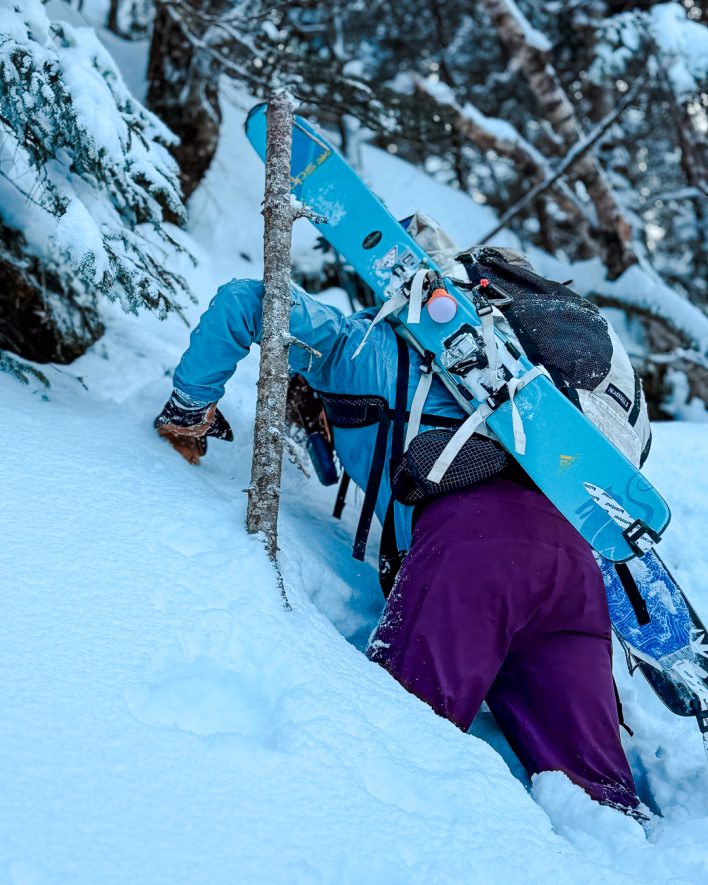
She hopes others can embrace her story. “We’ve all faced moments where we didn’t know how we’d get through. And then we did and came out wiser for it,” she says. “Sharing our stories helps us connect with others going through similar struggles.”
If anything, McGuire’s tumultuous past developed an unwavering belief in herself. She says, “When I find these peaks and I do something challenging, at least for a brief moment, I feel invincible.”



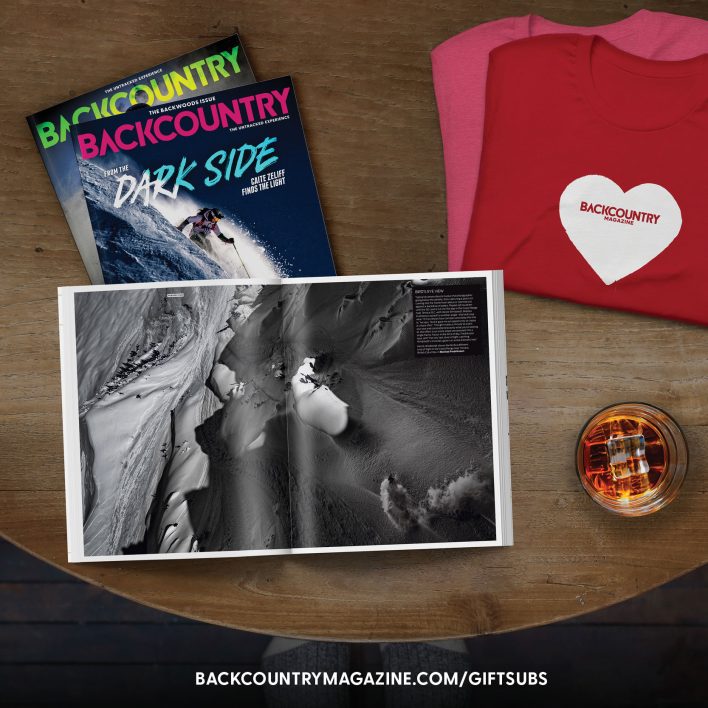




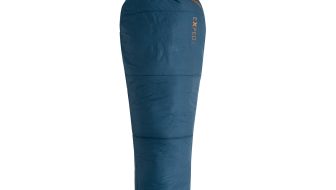
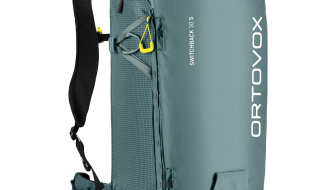

Amazing accomplishment Julie! So glad you completed this. Unbelievable expedition. Great job. See you on the hill
This story was incredibly inspiring! I love reading about women who challenge themselves to take the road (or mountain) less traveled. The author of this article did a beautiful job sharing Julie’s story! Well done! And keep climbing, Julie!!!